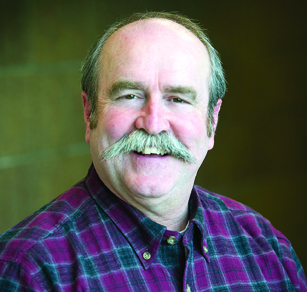The forest-loving Farm Bill at 25
 State Forester Bill O’Neill is chief of the Michigan Department of Natural Resources forestry division. He holds bachelor’s and master’s degrees in Forestry from Michigan State University.
State Forester Bill O’Neill is chief of the Michigan Department of Natural Resources forestry division. He holds bachelor’s and master’s degrees in Forestry from Michigan State University.
Many people have seen a two-person crosscut saw in action. For those who haven’t, it’s the lumberjacks’ long hand saw, with large teeth along its edge and hardwood handles at both ends.
While the pair of sawyers make it work, their efforts can look like a battle; each appearing to push at the blade and against the partner on the far end. In reality however, the sawyers are working in mutual cooperation, pulling one another along back and forth. And this is how we operate in the broader forest context; we help one another along to safeguard and withstand threats to Michigan’s woods and our diverse ways of life.
Forestry school at Michigan State University might have been the last time I worked up a sweat on a crosscut saw, but the lesson of collaborating to get things done has stayed with me. The partnerships I’m involved in these days entail far more than one other person. They’re bigger, more complex, and have more than two-and-a-half decades of trust and momentum behind them.
This year marks the 25th anniversary of the 1990 Farm Bill, which, for the first time, focused on fostering collaboration around issues related to forests, water and people. It built the framework that supports today’s partnerships among woodland owners, nonprofits, and federal, state and local governments. The Forestry Title introduced in the 1990 Farm Bill named the resulting new programs “Cooperative Forestry.”
Michigan relies on Cooperative Forestry programs to sustain economic development, sustainable forestry, and conservation in cities, towns and across our rural landscapes. The forest products industry, which ranks fifth in economic impact in the state, plays a critical role in providing economic benefits and jobs to people throughout Michigan. We are committed to ensuring this vital industry can remain vibrant, sustainable and competitive. As important, is improving the resiliency of our forests to successfully meet threats from diseases, invasive species and wildfire. We also need to help our aging family landowners and the next generation of landowners make plans to keep their forest land working, intact, and hopefully, in family hands. And we should continue our work to permanently conserve more woodlands and restore trees to the urban forests so many Michiganders love.
All these things are being done through collaboration, as they have for the past 25 years. More than 5 million of us live in Michigan cities that have benefited from grants and in-person training from professional urban foresters backed by Cooperative Forestry programs. Nearly 5,500 Michigan landowners have professional Forest Stewardship plans for their woodlands thanks to the 1990 Farm Bill and successive versions, with tens of thousands of acres responsibly managed and sharing their natural benefits with all of us. Land easements we’ve gained through the Forest Legacy Program have kept more than 155,000 forested acres working and protected for timber, recreation, water and wildlife.
And that’s not the only way private forest landowners have benefited. The state of Michigan has a Qualified Forest Program administered by the Michigan Department of Agriculture & Rural Development, which reduces property taxes for forest landowners in exchange for a long-term professional forest management plan. Over 300,000 acres are enrolled in the program, helping ensure forest sustainability well into our future. Michigan’s private landowners can get assistance from their local conservation district on the Qualified Forest Program.
What’s been happening for Michigan’s residents and woodlands since the 1990 Farm Bill is happening across the landscape. It must, because the benefits of forests come from natural processes that know no government or ownership boundaries. Over 25 years, Michigan, our partners, and our neighboring states have proved collaboration and cooperation are the keys to ensuring we may all enjoy healthier, more productive and beautiful forests.
The variability of Michigan’s land and people, from Hillsdale to Copper Harbor, is immense. I have spent my life in our woods and am still learning how much they have to give. Even more enduring and inspiring to me is the commitment to, and spirit of, collaboration from the diverse range of people I work with. They care selflessly about the forests and each other, and ultimately, they work on behalf of all of us. “Thanks” seems too little to say.
See what new members are saying about why they donated to Bridge Michigan:
- “In order for this information to be accurate and unbiased it must be underwritten by its readers, not by special interests.” - Larry S.
- “Not many other media sources report on the topics Bridge does.” - Susan B.
- “Your journalism is outstanding and rare these days.” - Mark S.
If you want to ensure the future of nonpartisan, nonprofit Michigan journalism, please become a member today. You, too, will be asked why you donated and maybe we'll feature your quote next time!

